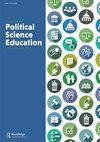构建综合计算社会科学研究模型
IF 0.6
Q3 POLITICAL SCIENCE
引用次数: 0
摘要
本文章由计算机程序翻译,如有差异,请以英文原文为准。
Building a Model for Integrative Computational Social Science Research
Abstract Universities are increasingly interested in providing courses that equip students with data science skills and engage experiential learning, particularly in the social sciences. However, these courses can be costly to implement and time-consuming for instructors to develop. This article describes an integrative learning model for teaching computational social science skills to undergraduate students. There are three elements to the model: content delivery through collaborative learning, skill development in an applied lab setting, and student mentorship. I apply this model to an experiential course where undergraduate students learn to create and conduct a national public opinion poll. The model addresses the need for university classes that equip undergraduate students with computational social science skills, and provides a pathway for training student researchers as teaching assistants for future courses. This model builds the research capacity of faculty, graduate assistants, and undergraduates, invests in data science by providing an infrastructure for the collection of large scale data over time, and integrates experiences inside and outside of the classroom. This model is replicable at other institutions and will be of benefit to programs seeking to implement best practices and maximize learning effectiveness through research integration.
求助全文
通过发布文献求助,成功后即可免费获取论文全文。
去求助
来源期刊

Journal of Political Science Education
POLITICAL SCIENCE-
CiteScore
1.80
自引率
36.40%
发文量
69
期刊介绍:
The Journal of Political Science Education is an intellectually rigorous, path-breaking, agenda-setting journal that publishes the highest quality scholarship on teaching and pedagogical issues in political science. The journal aims to represent the full range of questions, issues and approaches regarding political science education, including teaching-related issues, methods and techniques, learning/teaching activities and devices, educational assessment in political science, graduate education, and curriculum development. In particular, the journal''s Editors welcome studies that reflect the scholarship of teaching and learning, or works that would be informative and/or of practical use to the readers of the Journal of Political Science Education , and address topics in an empirical way, making use of the techniques that political scientists use in their own substantive research.
 求助内容:
求助内容: 应助结果提醒方式:
应助结果提醒方式:


